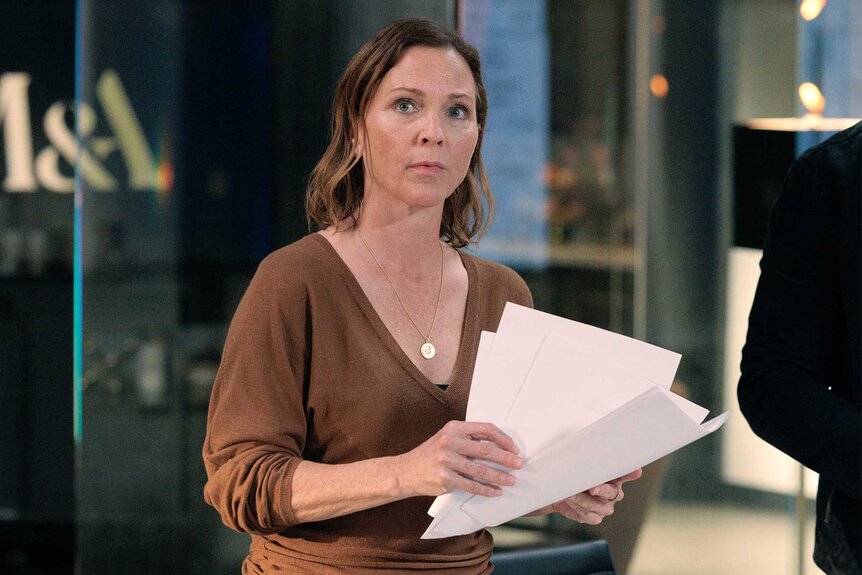Create a free profile to get unlimited access to exclusive show news, updates, and more!
What Impact Does Emancipation Have on Parental Rights? An Expert Weighs In
Found's Margaret Reed, played by Kelli Williams, gets a surprising request for emancipation from her daughter, but just what does that mean in everyday life?
A surprising visitor dropped a bombshell on Found’s Margaret Reed in the first season’s third episode.
Margaret’s known for her superpower of observance, but even she didn’t see this one coming.
Her daughter, Taylor, unexpectedly dropped by the office to dramatically hand her mother a petition for emancipation, in the hopes of severing their relationship.
“I just need you to sign these,” the teen said after pushing her way into the crisis management firm.
“Emancipation papers?” a confused Margaret, played by Kelli Williams, asked.
“Yeah, I don’t want you to be my mother anymore,” Taylor replied.
Margaret had been out of her daughter’s life for years after she was unable to overcome the trauma of her son’s disappearance, but her daughter’s request still gave Margaret a lot to consider.
To find out more about just what emancipation is and what it means for parental rights, NBC Insider spoke with New Jersey attorney Jennifer Weisberg Millner, the Chair of the Family Law and Divorce Group at Stark & Stark.
What is emancipation?
According to Millner, emancipation is “the termination of the parent child relationship” and isn’t actually very common.
“Emancipation is probably more prevalent in movies and things like that,” she said. “It’s actually a little bit more difficult in real life, so to speak.”
It’s also complicated because every state handles emancipation a little differently based on the individual laws within that state.
“Some states actually have laws that talk about when a child can apply for emancipation and they’ll have more specific requirements. So, like, for example New Mexico is one of those states that has a specific law that talks about emancipation of a minor,” she explained. “In other states, such as New Jersey, you have to make an application in the family court and you file a complaint and you have a judge then consider your application. You have to notice your parents and your parents can file an opposition.”
It differs from the legal termination of a parent’s rights, which might just sever the relationship a child has with one parent. Emancipation gives a child the same rights and responsibilities as an adult.
The biggest thing a judge will consider when evaluating an emancipation request is whether or not the person applying for emancipation can demonstrate that they will be able to support themselves on their own and are mature enough to make the same legal decisions that are granted to someone who has reached the age of majority, or 18 years old.
“I will tell you as a general rule that in most cases of request for a child to be emancipated, they’re at least going to have to show that they’ve been able to get a GED,” Millner said.
In the state of New Jersey, where Millner practices, there is no legal requirement to show any negligence on the part of the parent. Instead, the judge will focus on whether or not the child has demonstrated they have the ability to take care of themselves.
Judges often will look at the holistic family picture, however, and may decide that the child would be better served by receiving some type of social services, like family counseling or therapy. They may also decide to appoint the child a guardian ad litem. This is often an attorney or social worker that is tasked with determining what would be in the best interests of the child.
What Happens to a parent's rights in emancipation?
If a judge does grant the emancipation, it terminates the parent’s rights.
“You have no obligations, so therefore you have no rights,” Millner explained.
It also means if a parent dies, the child would not be eligible to inherit their estate.
“There’s no legal connection,” Millner said.
Millner stressed that emancipation is typically a “rarity.”
“I think that many parents would say they have incredibly bright, mature children, but really do we have a lot of 16-, 17-year-old children who are able to be out in the world with absolutely no guidance?” she asked.
For instance, a child would have to prove they can get a job that pays enough to support themselves, they’d have to find a landlord who would rent to someone who is under the age of 18, and prove they could find transportation.
How does emancipation differ from full custody?
In Margaret’s case, Margaret explained that she gave her ex-husband full custody of her two daughters years ago because she realized in her son’s absence she wasn’t able to be the parent they needed. She felt by removing herself, she was giving them the best opportunity to have a good life.
According to Millner, that might be a more likely scenario.
“If you give full custody of your child, number one, I still have a connection with that child,” she said. “Number two: I can always come back. I can come back into court and I can say, ‘Look, circumstances have changed,’ but emancipation in the vast majority of cases when it’s a child looking to be emancipated, it’s final.”
After much consideration, Margaret agreed to sign the emancipation papers that her daughter gave her, telling her to “do something wonderful with your life.”
“Your dad wanted you and your sister to have a normal life and he’s given you that. And it’s the only thing that gives me peace,” she told Taylor. “Letting you go was the only thing that I could give you.”
But as Millner pointed out, at least in New Jersey, the final decision about whether or not to grant an emancipation would lie with a judge, not the parent themselves.
“Ultimately as with any decision involving a child, it’s really what’s in the child’s best interests,” she said.


















